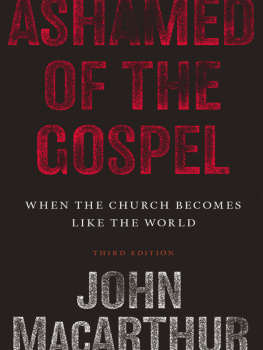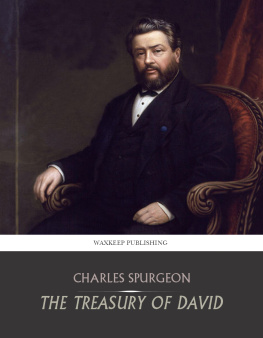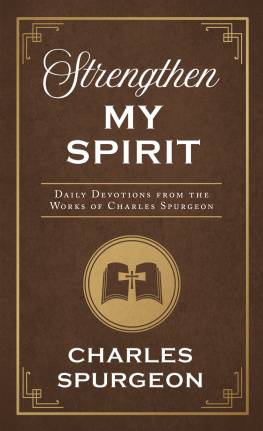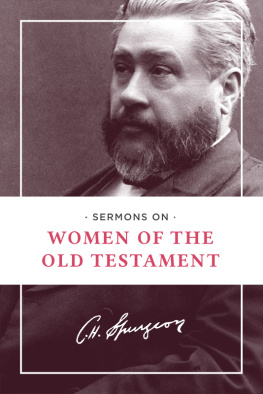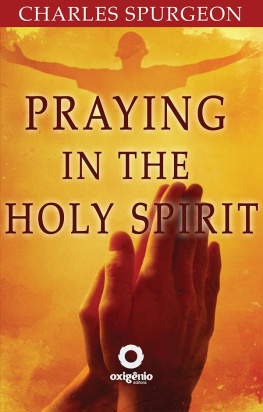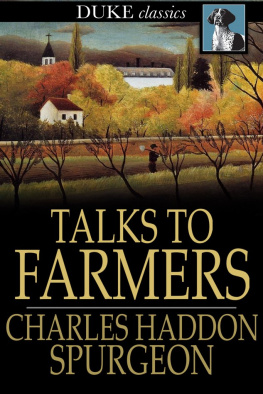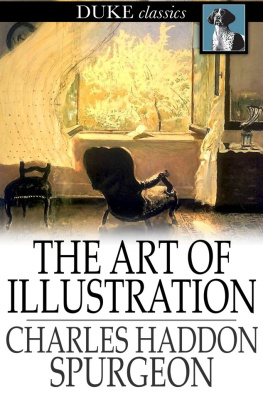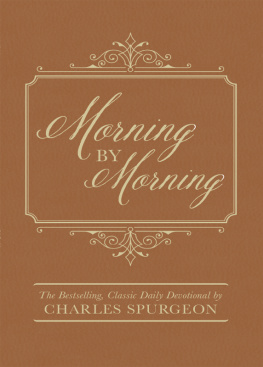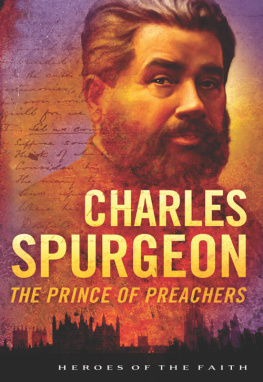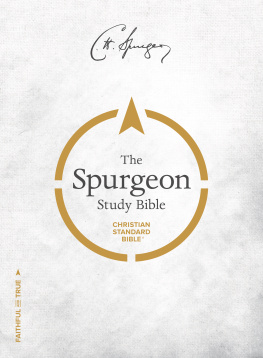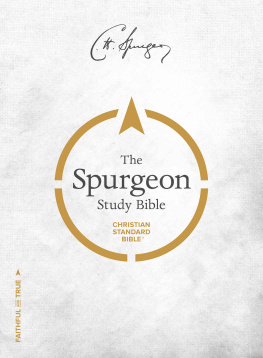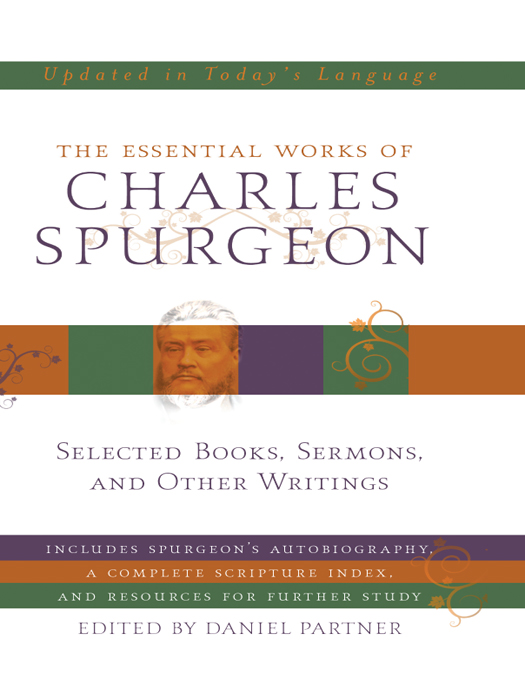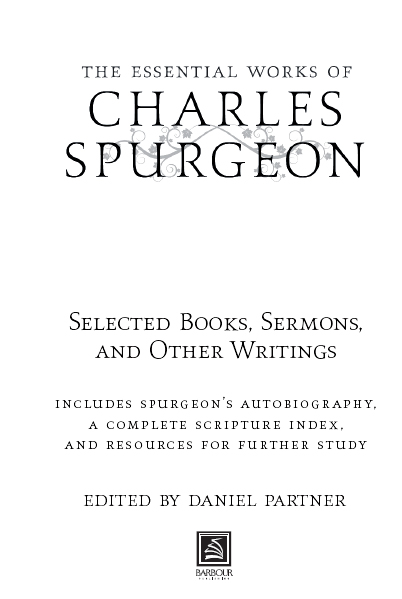2009 by Barbour Publishing, Inc.
Print ISBN 978-1-60260-387-5
eBook Editions:
Adobe Digital Edition (.epub) 978-1-60742-325-6
Kindle and MobiPocket Edition (.prc) 978-1-60742-326-3
All rights reserved. No part of this publication may be reproduced or transmitted for commercial purposes, except for brief quotations in printed reviews, without written permission of the publisher.
Churches and other noncommercial interests may reproduce portions of this book without the express written permission of Barbour Publishing, provided that the text does not exceed 500 words and that the text is not material quoted from another publisher. When reproducing text from this book, include the following credit line: From The Essential Works of Charles Spurgeon, published by Barbour Publishing, Inc. Used by permission.
All scripture quotations, unless otherwise indicated, are taken from the New King James Version. Copyright 1982 by Thomas Nelson, Inc. Used by permission. All rights reserved.
Scripture quotations marked KJV are taken from the King James Version of the Bible.
Published by Barbour Publishing, Inc., P.O. Box 719, Uhrichsville, Ohio 44683, www.barbourbooks.com
Our mission is to publish and distribute inspirational products offering exceptional value and biblical encouragement to the masses.

Printed in the United States of America.
The words of God have more power over me than ever Davids fingers had over his harp strings.
C HARLES H. S PURGEON
C ONTENTS
I NTRODUCTION
W HEN the coffin containing the remains of Charles Haddon Spurgeon was lowered into the grave at West Norwood Cemetery, London, on Thursday, February 12, 1892, a Bible lay upon its lid opened to Isaiah 45:22, which says, Look to Me, and be saved, all you ends of the earth!
That Bible may never have been there that day had it not been for the goodness of God in sending a snowstorm one Sunday morning forty-two years earlier while the fifteen-year-old Charles Spurgeon was making his way to church. As Spurgeon tells the story in his autobiography, When I could go no further, I turned down a side street and came to a little Primitive Methodist chapel. The man preaching that day, a very thin-looking man, a shoemaker or tailor or something of that sort, had chosen Isaiah 45:22 for his text. As his brief message ended, this man spoke directly to Spurgeon, who was the obvious visitor among the sparse congregation: Young man, look to Jesus Christ. Look! Look! Look! You have nothin to do but to look and live.
Years later, when people called him the Prince of Preachers, C. H. Spurgeon testified, When I heard that word look, what a charming word it seemed to me! Oh! I looked until I could almost have looked my eyes away. He then quoted William Cowpers well-known hymn:
Eer since by faith I saw the stream Thy flowing wounds supply, Redeeming love has been my theme, And shall be till I die.
Born June 19, 1834, in Kelvedon, Essex, Spurgeon was baptized on May 3, 1850, in the river at Iselham. About six months later he delivered his first sermon in a cottage at Teversham, Cambridge. In 1851 he became pastor of a small Baptist church in Cambridgeshire, and his first literary work, a gospel tract, was printed in 1853. From there, it pleased God to speedily place him among the preeminent preachers of the nineteenth century. Of them all, Spurgeon is, in our day, arguably the best known and most influential.
It was April 1854 when C. H. Spurgeon assumed the pastorate of Londons New Park Street Chapel, the largest Baptist congregation in London. The Boy Preacher, as he was known at the time, was soon renowned in London. Short and stout, not particularly well dressed, and with a face a contemporary described as homely, Spurgeons flesh was evidently not the cause of his popularity. Like the apostle Paul, he also did not boast in fleshly wisdom, since he had no formal education in theology (2 Cor. 1:12). Rather, the reader will find in the selections from his sermons and writings collected in this book that Spurgeons attraction is the grace of God conveyed by the sacred scriptures. As he said, The words of God have more power over me than ever Davids fingers had over his harp strings.
Yes, God gave Charles Spurgeon an ample portion of grace in gifts such as the word of wisdom and the word of knowledge (1 Cor. 12:4, 8), and he had significant oratorical powersbut again like the apostle, he did not use these gifts as some do, peddling the word of God (2 Cor. 2:17). Rather, he said, It is better to preach five words of Gods Word than five million words of mans wisdom.
The year 1855 saw the beginning of the publication of C. H. Spurgeons sermons. Recorded by stenographers, these were reviewed by the preacher before being printed and distributed throughout the United Kingdom. In 1865 they sold twenty-five thousand copies a week at a penny each and were translated into twenty languages. At the time of his death, Spurgeon had preached nearly thirty-six hundred sermons. These were published in yearly bound volumes that eventually numbered sixty-three. Their publication ceased in 1917, but they are now available in reprint editions. Sixty of these sermons are collected in this book, lightly edited to modernize some language, spelling, and punctuation.
Numbering two to three hundred people when he arrived, the congregation of Park Street Chapel mushroomed until, at age twenty-two, Spurgeon found himself preaching to gatherings of ten thousand at Surrey Music Hall and was the most popular preacher of the day. His marriage to Susanna Thompson of London came in 1856. Twin sons soon followed.
That same year, he founded a pastors college in Camberwell. It is now located in South Norwood Hill, London, and named Spurgeons College. On October 7 the next year, an audience of 23,654 people heard him preach at Londons Crystal Palacethe largest audience ever to hear his preaching of the gospel.
His congregation moved into the newly built Metropolitan Tabernacle in Londons Southwark district on March 6, 1861; Charles Spurgeon was three years shy of his thirtieth birthday. Designed in the Greek revival style, this building accommodated gatherings of six thousand people blessed to hear the sermons of the Prince of Preachers and sing a cappella from Our Own Hymnal, a collection he selected.
The reader will notice that Spurgeons sermons are laced with many lines and verses from hymns. He spoke from a brief outline only, so these sprang from the preachers memory. His grandmother, who raised him in early childhood, encouraged the boys faith by giving him a penny for each hymn he could memorize. Eventually his proficiency caused her to reduce the payment to a halfpenny to save expense. Years later, these hymns turned up in Spurgeons sermons.
Naturally, controversy attended such a celebrated man. Newspapers caricatured and Christians opposed. After a controversy over deistic hymns, he said, We shall soon have to handle truth, not with kid gloves, but with gauntletsthe gauntlets of holy courage and integrity. He challenged the practice of infant baptism as practiced by the Church of England and the Methodists and more significantly engaged in the Downgrade Controversy among the Baptists. He held that some Baptists downgraded the place of the Bible in the church by subscribing to the idea that the Pentateuch was not written by one person and by entertaining Darwins theory of evolution by natural selection, among other things. As a result, on October 26, 1887, Spurgeon withdrew from the Baptist Union, the main association of Baptist ministers. In this way, his Metropolitan Tabernacle became the largest independent congregation in the world, anticipating the modern-day megachurch.


